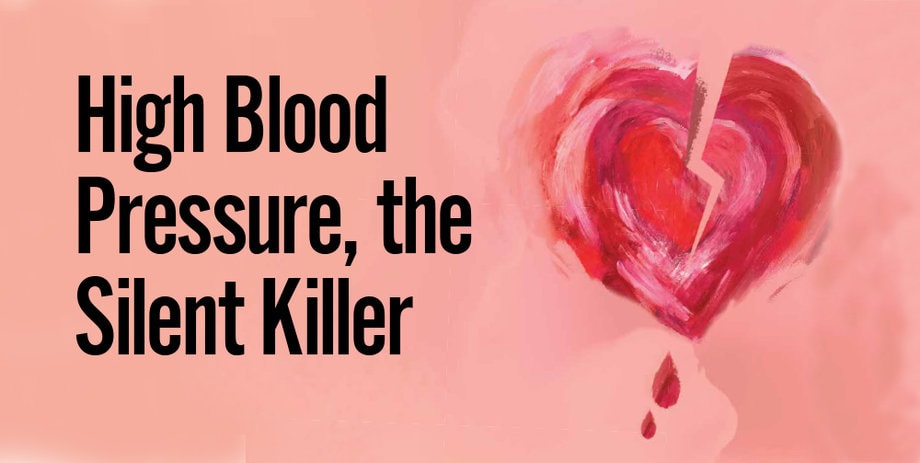Why Hypertension Is Called The “Silent Killer”?

Hypertension, commonly known as high blood pressure, is often referred to as the ‘silent killer’ due to its asymptomatic nature. This chronic medical condition affects a significant portion of the global population, contributing to the burden of cardiovascular diseases.
The term ‘silent killer’ emphasizes the absence of overt symptoms that would typically prompt individuals to seek medical attention. This phenomenon poses a critical challenge for timely diagnosis and management, as individuals may remain unaware of their condition until serious complications arise.
Consequently, hypertension can silently exert its detrimental effects on various organ systems, including the heart, brain, kidneys, and blood vessels, leading to severe consequences such as heart attacks, strokes, and kidney damage.
Understanding the underlying reasons for the silent nature of hypertension, along with the associated risks and possible interventions, is crucial for effective prevention and management strategies. This article aims to explore the prevalence, dangers, risk factors, diagnosis, monitoring, and treatment options for hypertension, shedding light on why it is rightfully called the ‘silent killer’.
Key Takeaways
- Hypertension is called the ‘silent killer’ due to its long-term consequences.
- Early detection allows for timely intervention and appropriate management.
- Failure to control blood pressure can lead to severe complications.
- Regular blood pressure monitoring is crucial for preventing complications.
The Prevalence of Hypertension
The prevalence of hypertension highlights the urgent need for public health interventions to address this silent killer.
According to prevalence data, hypertension is a global burden affecting millions of individuals worldwide. It is estimated that approximately 1.13 billion people suffer from hypertension globally, with the number projected to increase to 1.56 billion by 2025.
This alarming prevalence underscores the significance of understanding the risks and consequences associated with this condition. Hypertension often goes undetected due to its asymptomatic nature, earning it the moniker of the ‘silent killer.’ It quietly damages vital organs such as the heart, brain, and kidneys, increasing the risk of cardiovascular diseases, stroke, and renal failure.
Public health strategies, including awareness campaigns, regular blood pressure screenings, and lifestyle modifications, are crucial in combating the silent epidemic of hypertension and reducing its global impact.
Understanding the Silent Nature of Hypertension
Hypertension is often referred to as the ‘silent killer’ due to its lack of symptoms. Unlike other medical conditions that may present noticeable signs, hypertension can go unnoticed for years, leading to serious complications.
Moreover, it is characterized by a gradual progression, making it even more challenging to detect and manage without regular blood pressure monitoring.
Lack of Symptoms
Lack of symptoms associated with hypertension renders it difficult to detect and manage, leading to its classification as the ‘silent killer’.
This lack of awareness about its presence in the body poses a hidden danger, as it allows the condition to progress unnoticed, increasing the risk of serious complications such as heart attack, stroke, and kidney disease.
The absence of noticeable symptoms often leads individuals to underestimate the importance of monitoring their blood pressure levels regularly. Furthermore, since hypertension is typically asymptomatic, individuals may not seek medical attention until irreversible damage has occurred.
This highlights the pressing need for increased awareness and routine screenings to identify and manage hypertension early on, minimizing the potential harm it can cause.
Gradual Progression
One notable aspect regarding the progression of hypertension is its gradual nature. Unlike acute conditions that present immediate symptoms, hypertension often develops over a long period of time, making it difficult to detect without regular blood pressure monitoring.
This gradual progression is one of the reasons why hypertension is often referred to as the ‘silent killer.’ The absence of noticeable symptoms during the early stages can lead individuals to underestimate the severity of the condition and delay seeking medical attention.
However, the long-term effects of hypertension can be devastating. Uncontrolled high blood pressure can damage blood vessels, leading to heart disease, stroke, kidney damage, and other serious complications.
Therefore, it is crucial for individuals to understand the importance of regular blood pressure monitoring and early intervention to prevent these potentially life-threatening consequences.
The Dangers of Uncontrolled Hypertension
This paragraph discusses the dangers of uncontrolled hypertension, specifically focusing on the increased risk of cardiovascular disease and the impact on organs and body systems.
Uncontrolled hypertension can significantly increase the risk of cardiovascular disease, including conditions such as heart attacks and strokes.
In addition, it can have detrimental effects on various organs and body systems, such as the kidneys, eyes, and blood vessels.
Increased Risk of Cardiovascular Disease
The heightened risk of cardiovascular disease associated with hypertension highlights the urgent need for early detection and optimal management of this condition. Hypertension, also known as high blood pressure, is often called the “silent killer” because it typically does not cause noticeable symptoms until it has already caused significant damage. Uncontrolled hypertension can lead to increased mortality and long-term complications, particularly cardiovascular disease. Individuals with hypertension are at a higher risk for conditions such as heart attacks, strokes, heart failure, and kidney disease. According to research, hypertension is responsible for approximately half of all cases of cardiovascular disease worldwide. Early detection and effective management of hypertension through lifestyle changes and medications can significantly reduce the risk of developing cardiovascular disease and its associated complications.
| Complications of Uncontrolled Hypertension |
|---|
| Increased Risk of Heart Attacks |
| Higher Chance of Strokes |
| Greater Probability of Heart Failure |
Impact on Organs and Body Systems
The impact of hypertension on various organs and body systems is a significant concern due to its potential to cause long-term complications and increased mortality. Uncontrolled high blood pressure can lead to organ damage, particularly in the heart, brain, kidneys, and blood vessels.
The heart is particularly vulnerable to the effects of hypertension, as it has to work harder to pump blood against increased resistance. This can result in the development of conditions such as coronary artery disease, heart failure, and arrhythmias.
Additionally, hypertension can cause damage to the blood vessels in the brain, leading to an increased risk of stroke.
The kidneys may also be affected, with hypertension being a leading cause of chronic kidney disease.
Systemically, hypertension can have detrimental effects on the body, including promoting inflammation, impairing blood vessel function, and increasing the risk of atherosclerosis.
Therefore, it is crucial to manage hypertension effectively to prevent organ damage and minimize its systemic effects.
Risk Factors for Hypertension
One key aspect to consider when examining risk factors for hypertension is the role of lifestyle choices and genetic predisposition.
Risk factors for hypertension can be categorized into two main groups: modifiable and non-modifiable factors. Modifiable risk factors include unhealthy dietary habits, lack of physical activity, smoking, alcohol consumption, and obesity. These factors can be addressed through lifestyle modifications, such as adopting a healthy diet rich in fruits and vegetables, engaging in regular exercise, quitting smoking, limiting alcohol intake, and maintaining a healthy weight.
On the other hand, non-modifiable risk factors, such as age, gender, family history, and race, cannot be changed. However, individuals with these risk factors can still take preventive measures by managing other modifiable risk factors.
Overall, understanding and addressing these risk factors is crucial in preventing and managing hypertension.
Diagnosis and Monitoring of Hypertension
Diagnosis and monitoring of hypertension involves the use of various clinical measurements and tests to accurately assess an individual’s blood pressure levels and identify any underlying health conditions or organ damage.
Accurate diagnosis of hypertension is crucial as it enables healthcare professionals to determine appropriate treatment options and establish effective management strategies.
The diagnosis techniques commonly employed include in-clinic blood pressure measurements, ambulatory blood pressure monitoring, and home blood pressure monitoring. These techniques provide valuable information about an individual’s blood pressure patterns over a period of time, allowing for a more comprehensive assessment.
Treatment options for hypertension may include lifestyle modifications, such as adopting a healthy diet and engaging in regular physical activity, as well as the use of antihypertensive medications.
Regular monitoring of blood pressure levels is essential to ensure that treatment is effective in controlling blood pressure and reducing the risk of complications.
Lifestyle Modifications for Managing Hypertension
This paragraph will discuss the lifestyle modifications that can be implemented for managing hypertension. It will focus on three key points: healthy diet and weight management, regular physical activity, and stress reduction techniques.
These lifestyle modifications are important for individuals with hypertension as they have been shown to effectively lower blood pressure levels and reduce the risk of cardiovascular events.
By adopting a healthy diet, engaging in regular physical activity, and practicing stress reduction techniques, individuals can take proactive steps towards managing their hypertension and improving their overall health.
Healthy Diet and Weight Management
Implementing a healthy diet and managing weight can play a crucial role in controlling hypertension, making it imperative to understand the significance of these lifestyle factors in combating the silent killer.
The first step towards a healthy diet is adopting a pattern of healthy eating, which includes consuming a variety of fruits, vegetables, whole grains, lean proteins, and low-fat dairy products. This dietary approach, known as the Dietary Approaches to Stop Hypertension (DASH) diet, has been proven effective in lowering blood pressure.
Additionally, individuals should limit their intake of sodium, saturated fats, and added sugars.
Alongside a healthy diet, maintaining an appropriate weight through regular physical activity is essential. Engaging in an exercise routine that combines aerobic activities, such as brisk walking or cycling, with strength training exercises not only aids weight management but also helps lower blood pressure.
By incorporating these lifestyle modifications, individuals can take proactive steps in managing hypertension and reducing its silent yet deadly consequences.
Regular Physical Activity
Regular physical activity is an essential aspect of preventing hypertension, making it a crucial topic to discuss in the context of the ‘silent killer.’ Engaging in exercise has numerous benefits that can help lower blood pressure and reduce the risk of developing hypertension. Incorporating regular physical activity into one’s routine can improve cardiovascular health, enhance blood circulation, and strengthen the heart muscle.
Additionally, exercise aids in weight management, which is another crucial factor in preventing hypertension. By maintaining a healthy weight, individuals can reduce the strain on their blood vessels and lower their blood pressure levels. Furthermore, physical activity promotes the release of endorphins, which can improve mood and reduce stress, contributing to overall well-being.
Emphasizing the importance of regular exercise is key to preventing hypertension and its potentially devastating consequences.
- Improved cardiovascular health
- Enhanced blood circulation
- Strengthened heart muscle
- Weight management
- Mood enhancement and stress reduction
Stress Reduction Techniques
Stress reduction techniques are important in promoting overall well-being and can contribute to lowering blood pressure levels. Chronic stress has been identified as a risk factor for hypertension, and implementing stress management strategies can help individuals effectively cope with daily stressors.
Relaxation techniques, such as deep breathing exercises, progressive muscle relaxation, and mindfulness meditation, have been shown to have a positive impact on reducing stress and lowering blood pressure. These techniques promote a state of relaxation and calmness, which can counteract the physiological effects of stress on the body.
Engaging in regular practice of stress reduction techniques can lead to improved mental and physical health, ultimately helping to prevent and manage hypertension. Incorporating these techniques into one’s lifestyle can contribute to a holistic approach to blood pressure management.
Medications for Hypertension
Medications commonly prescribed for hypertension include angiotensin-converting enzyme inhibitors, angiotensin receptor blockers, beta blockers, diuretics, and calcium channel blockers. These medications work by targeting different mechanisms involved in blood pressure regulation. While they are effective in reducing hypertension, it is important to note that medication effectiveness may vary among individuals.
Some people may experience side effects such as dizziness, fatigue, or headaches. It is crucial for healthcare providers to closely monitor patients’ response to medications and adjust the dosage accordingly.
In addition to medications, alternative treatments such as lifestyle modifications, dietary changes, and stress reduction techniques can also play a significant role in managing hypertension. It is important for individuals with hypertension to discuss all available options with their healthcare provider to determine the most appropriate treatment plan for their specific needs.
- Medications can significantly lower blood pressure levels.
- Side effects may include dizziness, fatigue, or headaches.
- Close monitoring and dosage adjustments are necessary.
- Lifestyle modifications and dietary changes can complement medication.
- Stress reduction techniques can also help manage hypertension.
Importance of Regular Blood Pressure Monitoring and Management
Consistent monitoring and management of blood pressure levels are essential in preventing potential complications and maintaining overall cardiovascular health. Hypertension, often referred to as the ‘silent killer,’ is a condition characterized by high blood pressure that can have serious long-term consequences if left undetected and uncontrolled.
Early detection of hypertension is crucial as it allows for timely intervention and the implementation of appropriate management strategies. Regular blood pressure monitoring enables healthcare professionals to assess the effectiveness of treatment plans and make necessary adjustments.
Failure to manage and control blood pressure levels can lead to severe complications such as heart attack, stroke, kidney disease, and heart failure. Therefore, individuals with hypertension should prioritize regular blood pressure monitoring and work closely with their healthcare providers to develop an effective management plan to prevent the development of potentially life-threatening complications.
Frequently Asked Questions
Can hypertension be cured completely with medications and lifestyle modifications?
Hypertension management involves a combination of medications and lifestyle modifications. While medications can effectively control and reduce blood pressure, lifestyle changes such as maintaining a healthy diet, regular exercise, and stress management also play a crucial role in managing hypertension.
How often should blood pressure be monitored and managed for individuals with hypertension?
Blood pressure should be regularly monitored for individuals with hypertension to ensure effective management. The frequency of monitoring depends on the severity of the condition and the individual’s response to treatment. Various techniques, including lifestyle modifications and medication, are employed for hypertension management.
Are there any natural remedies or alternative therapies that can effectively manage hypertension?
There are several natural remedies and alternative therapies that can effectively manage hypertension. These include lifestyle changes such as regular physical activity, maintaining a healthy diet, reducing stress, and using relaxation techniques.
Can hypertension lead to other health complications apart from heart disease and stroke?
Hypertension can lead to other health complications, such as kidney disease and vision problems. These conditions may arise due to the sustained high blood pressure damaging the blood vessels in the kidneys and eyes.
Is it possible for individuals with normal blood pressure to develop hypertension later in life?
Preventive measures and risk factors are essential in understanding if individuals with normal blood pressure can develop hypertension later in life. Identifying and managing risk factors can help prevent the development of hypertension.








